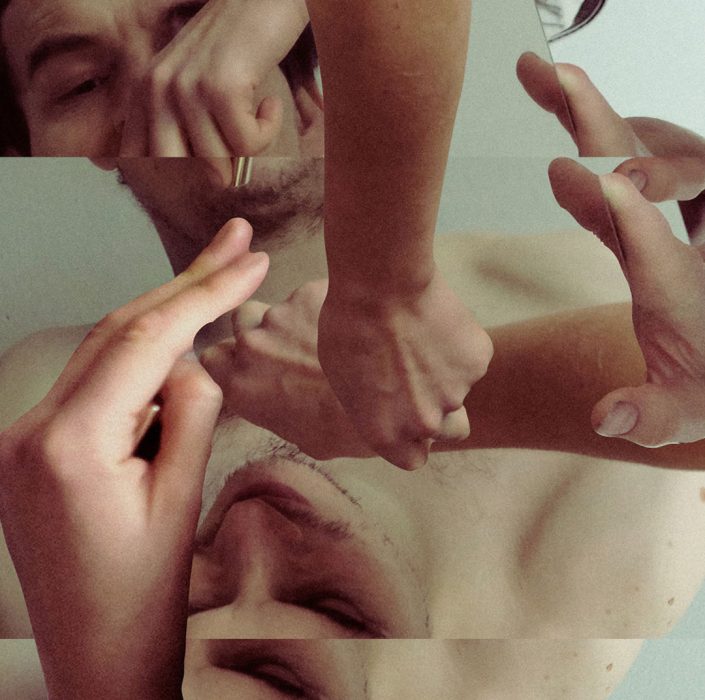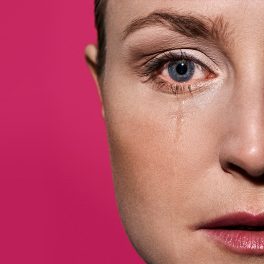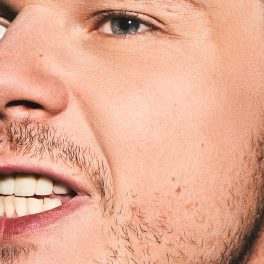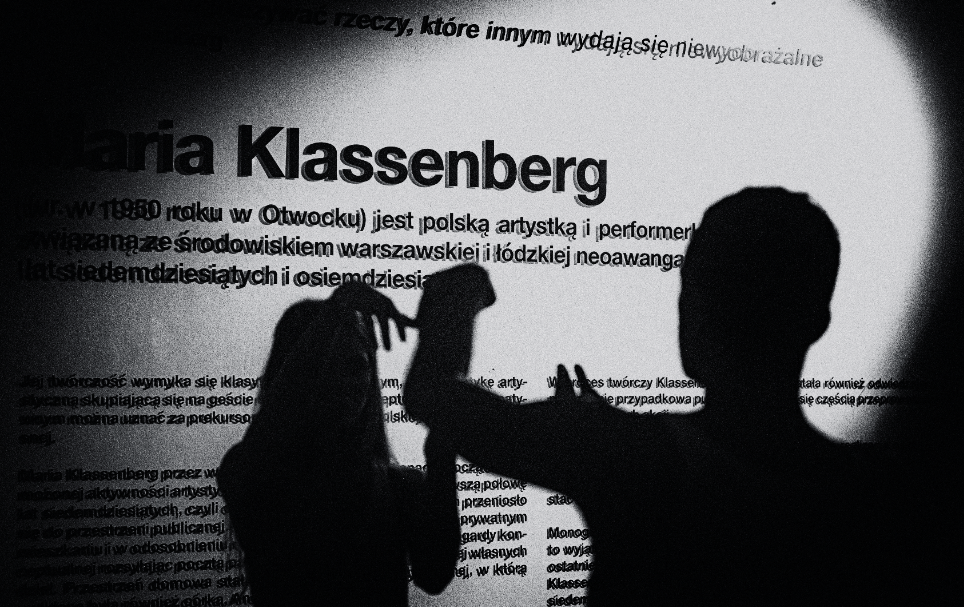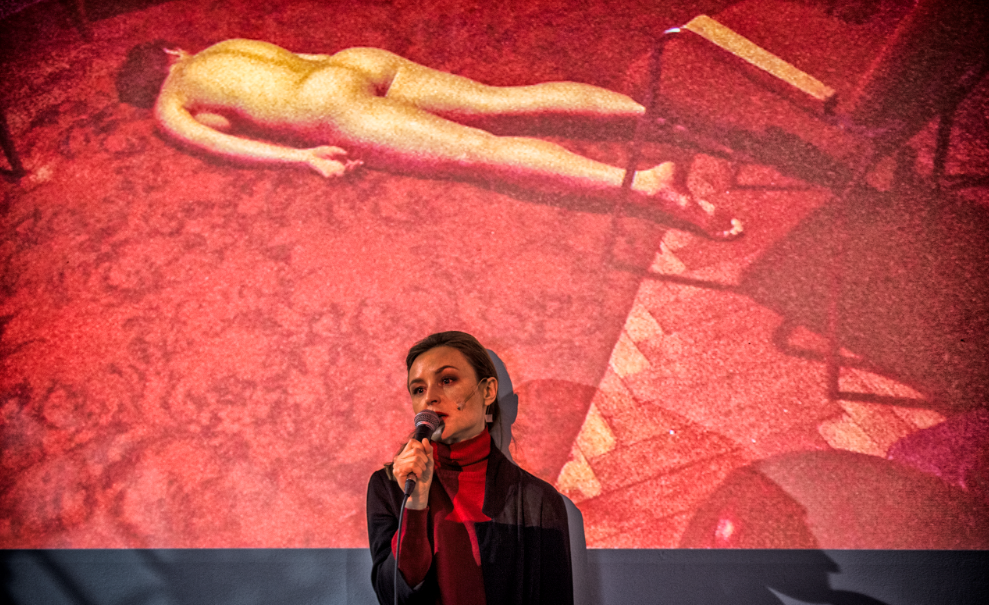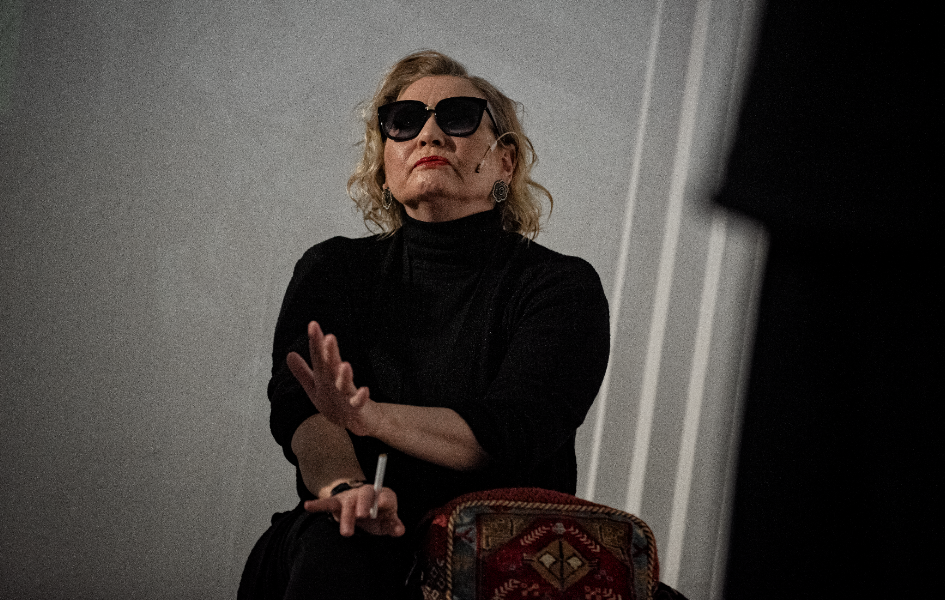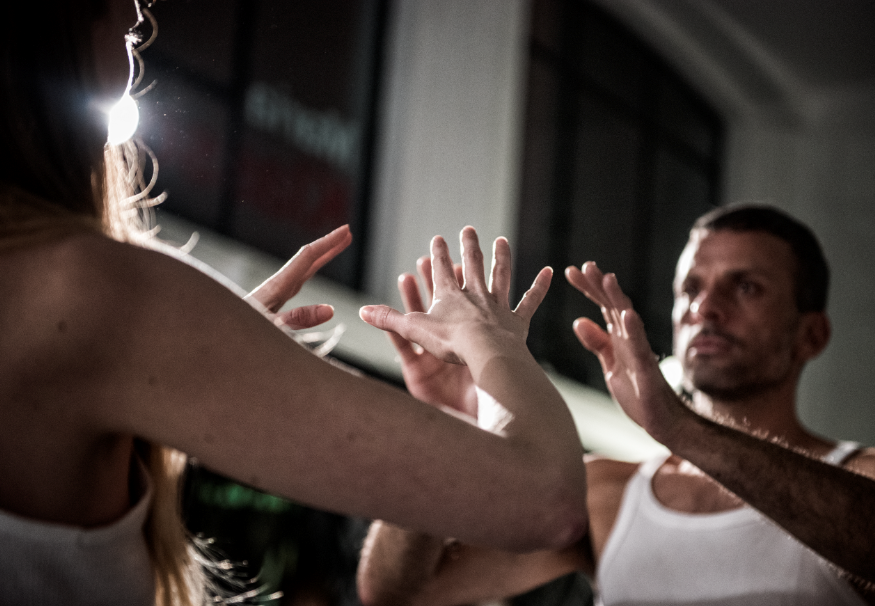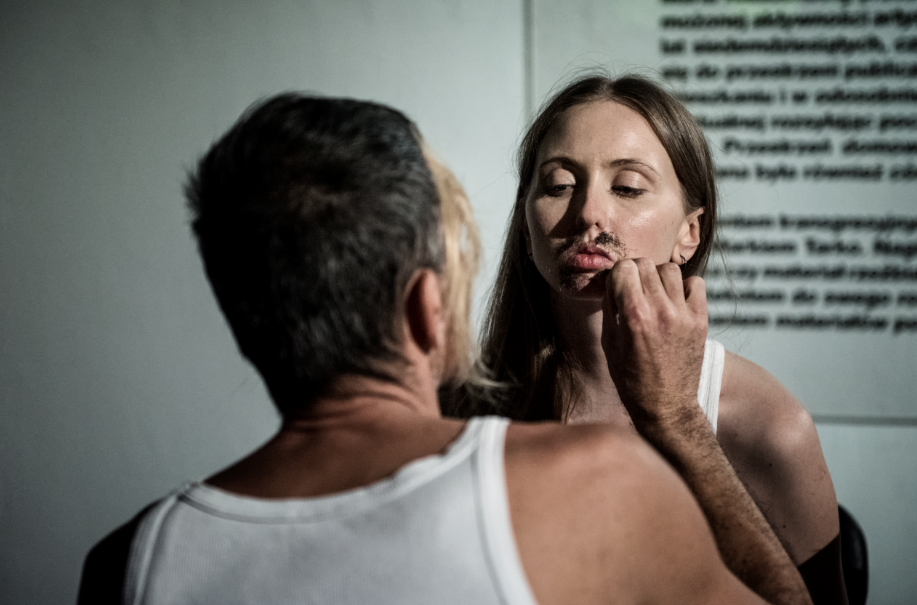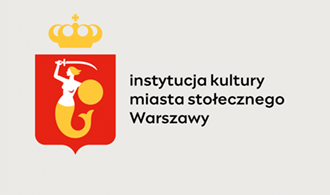Maria Klassenberg
dir.Katarzyna Kalwat-
Directed by
Katarzyna Kalwat
-
Dramaturgy
Beniamin Bukowski
-
Premiered
November 14, 2020 Raster Gallery, 63 Wspólna Str., Warsaw
About
A theatre production-performance art-art exhibition built around the biography and work of Maria Klassenberg, a forgotten contemporary artist. At an opening of an exhibition of her works, the artist confronts her personal history of relationship with her daughter. Her works in the form of recorded performances, objects and installations create the project’s context. “Maria Klassenberg” is a theatre installation designed to be presented in a gallery space.
Voices of the artist and her daughter – a personally invested observer, will create a multidimensional portrait of a 20th century artist left unmentioned by the art history textbooks. An additional context will be added by Anda Rottenberg’s – a critic and art historian. Her commentary will place Maria Klassenberg’s portfolio in the Polish and international avant-garde art history.
An exhibition of Maria Klassenberg’s archive created by Aneta Grzeszykowska in cooperation with Jan Smaga and expanded to include an archive of work on the project will accompany presentations of the performance. The performance will be presented in a space that will be, at the same time, an independent exhibition space open for the public before and after the performances.
Who is Maria Klassenberg?
Visual artist and performer Maria Klassenberg did not exist, she was made up. She was brought to life in March 2019 by director Katarzyna Kalwat and a group of collaborating creators, who meticulously reconstructed her biography, creative legacy and archive. However being a fiction is not the same as not being the truth. Klassenberg’s nonexistence symbolizes all rejected, remarkable heroes of Polish avant-garde, whose work exists outside the official artistic circuit.
Anda Rottenberg, a critic and art historian, exercises curatorial care over the symbolic heritage of Maria Klassenberg. Execution of this multistage artistic project involved performers, actors and actresses, visual artists, critics and curators who validated this artist’s existence. “Maria Klassenberg’s Archive, 1970-1980” was recreated by Aneta Grzeszkowska – a visual artist associated with Raster Gallery, in cooperation with Jan Smaga and a curator – Joanna Zielińska.
Maria Klassenberg Work In Progress
Concept of the performance was developed during Katarzyna Kalwat’s artistic residency in Paris in 2018, within the framework of Institut français’s and Cité Internationale des Arts in Paris programme. First presentations of “Maria Klassenberg. Ecstasies” work in progress took place in The Ujazdowski Castle Centre for Contemporary Art in March 2019 (within the Generation After. Showcase organized by the Nowy Teatr in Warsaw) and in June 2019 (within the frame of SIBMAS congress – the International Association of Libraries, Museums, Archives and Documentation Centres of the Performing Arts).
The final stage of this project will be an international premiere of the theatre performance “Maria Klassenberg” accompanied by an exhibition of the artist’s works. The project is coproduced by TR Warszawa and Volksbühne (Berlin) within the frame of POSTWEST festival. Initially, the premiere was scheduled to take place on May 27, 2020 in Berlin and in autumn 2020 in Warsaw. Due to the COVID-19 pandemic, the premiere was rescheduled to autumn 2020 and it will take place in Warsaw.
In late May 2020, within TR Online and Volksbühne’s POSTWEST online international artistic festival funded by the Kulturstiftung des Bundes, creators of the Maria Klassenberg project invited interested public to participate in a performance “Maria Klassenberg. Home choreographies”, created specifically for the time of quarantine. The May artistic activities were initiated by actors from TR Warszawa ensemble: Jan Dravnel and Justyna Wasilewska, by actors from Volksbühne Berlin ensemble: Sarah Franke and Daniel Nerlich and a critic and art historian – Anda Rottenberg. The entire performance was live streamed on the TR Warszawa and Volksbühne Berlin Facebook pages and the recorded video will be screened during the planned theatre performance and exhibition of Maria Klassenberg’s works.
Pod koniec maja 2020 roku, w ramach programu TR Online oraz organizowanego przez Volksbühne ze środków Kulturstiftung des Bundes międzynarodowego festiwalu artystycznego Postwesr online, twórcy i twórczynie projektu o Marii Klassenberg zaprosili wszystkich chętnych/wszystkie chętne do udziału w przygotowanym specjalnie na czas kwarantanny performansie “Maria Klassenberg. Choreografie domowe”. Majowe działanie artystyczne rozpoczęli aktorzy TR Warszawa – Jan Dravnel i Justyna Wasilewska, aktorzy Volksbühne Berlin – Sarah Franke i Daniel Nerlich oraz kuratorka i historyczka sztuki, Anda Rottenberg. Cały performans transmitowany był na żywo na Facebooku TR Warszawa i Volksbühne Berlin, a zapis wideo wydarzenia znajdzie się w planowanym spektaklu i wystawie poświęconej twórczości Marii Klassenberg.
Cast
Twórcy i twórczynie
reżyseria i koncepcja: Katarzyna Kalwat
tekst i dramaturgia: Beniamin Bukowski
scenografia, kostiumy, światło: Anna Tomczyńska
muzyka: Wojtek Blecharz
współpraca: Anna Grzelewska, Joanna Zielińska
Archiwum Marii Klassenberg, 1970-1980 (koncepcja, scenariusz, opracowanie): Aneta Grzeszykowska
współpraca: Jan Smaga
scenografia, kostiumy, światło: Anna Tomczyńska
performerzy (archiwum): Anna Rutkowska, Wojciech Żera
Realizacja
Maria Klassenberg
kierowniczka produkcji: Magda Igielska
współpraca produkcyjna: Maria Herbich
“Maria Klassenberg. Ekstazy” work in progress
asystentka reżyserki, inspicjentka: Karolina Gębska
kierowniczka produkcji: Marta Kuźmiak
Galeria
fot. Magda Hueckel
Reviews
-
“Maria Klassenberg does not exist. She never did”’ – announces Urszula Kiebzak in the finale monologue. […] director gives the floor to the actress who puts herself somewhere beside the role and exposes the reliances that rule the institution she works in. The reason behind the creation of Maria’s character is revealed. It’s a very important reason, difficult to downplay, because it concernes the issue of the presence of female voice in the public space”
-
Maria Klassenberg is the most radical creator of Polish, and perhaps even international, contemporary art. She is a fantasmatic character with a made-up archive. (…) “Maria Klassenberg does not exist. She never did. We created her, but being a fiction is not the same as not being the truth” – proclaims Urszula Kiebzak in the final monologue of a theatre production-performance art-artexhibition “Maria Klassenberg. Ecstasies”. As a proof, she points to herself and her condition. If after an hour of looking at a mature, stubbornly quiet woman, we believe that in front of us sits an unknown radical artist, who participates in her first ever retrospective exhibition organized by Anda Rottenberg, then it means that Kiebzak herself is totally anonymous to us. She does not exist in our awareness as an artist, despite the fact that she has been working in The National Stary Theatre for over 40 years, and with very well recognized directors.. whose names form a very long list, carefully enumerated.. “With one exception, all male. So many.” She concludes. It is easy to forget women, who create. Even easier not to hear about them at all.”
-
Inversion becomes a carefully implemented strategy of Maria Klassenberg – or perhaps a strategy of Katarzyny Kalwat, who stages the artist’s life. A critic and art historian (in this role Anda Rottenberg) fits Klassenberg’s works in the past decades and describes her by referring to subsequent “phases”. Each of such phases anticipates major breakthrough in art. However Klassenberg is never there with the rest. She does not “catch on”. In the 80’s, when the strength of declaration is the key, she retracts. In the 90’s, when everybody sells, she refuses. Today, she is an old woman, not wanted by anyone on the market wants anymore.
And still, she keeps silent. At the same time, the process of introducing Klassenberg into the artistic circuit – its critique and market aspect – becomes a critique and parody of the circuit itself. Numerous labels, serious voice of the interpreter, atmosphere of a vernissage and the daughter’s speech, that is both a confession and a manifesto – all of that exposes the absurdity of what would be at the stake.”
Iwona Kurz, “Widok. Teorie i praktyki kultury wizualnej”
Partners
-
The project is produced with the support of Kulturstiftung des Bundes and The Foundation for Polish-German Cooperation.

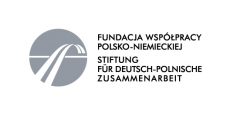
The new talents line
The performance was produced within the frame of the new talents line programme. TR Warszawa for many years now has been promoting new artistic talents through such projects as: Warsaw Area [orig.: Teren Warszawa], TR/PL, Field TR [orig.: Teren TR], Young TR [orig.: Młody TR], TR Debut [orig.: Debiut TR], artistic residencies, guest showings of diploma works and performances, repertoire showings of performances co-created by new artists and production of selected projects in cooperation with foreign partners. TR Warszawa provides artistic shelter, where artists may experiment and implement their ideas for theatre.
Within the new talents line in the past artistic seasons, the following directors presented their productions: Wojciech Blecharz (“Soundwork”), Klaudia Hartung-Wójciak (“The Chinese”), Grzegorz Jaremko (“Woyzeck”), Katarzyna Kalwat (“Holzwege”, “Rechnitz. Opera – The Exterminating Angel”, “Maria Klassenberg. Ecstasies”, “Staff Only” – coproduced by Biennale Warszawa and TR Warszawa), Anna Karasińska (“Ewelina’s Crying” and “Fantasia”), Katarzyna Minkowska (“Stream”), Jędrzej Piaskowski (“Puppenhaus. Treatment”, “David Is Going To Israel”), Piotr Trojan (“Grind/r”), Magda Szpecht (“The Possibility of an Island”, “Always Coming Home”), and Małgorzata Wdowik (“The Footballers” and “Fear”)
